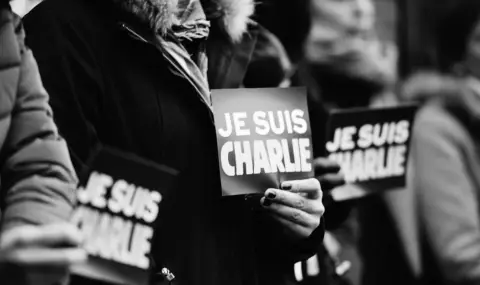On January 7, 2015, gunmen stormed the offices of the French satirical magazine “Charlie Hebdo“ and killed 12 people. The attack was a response to the magazine's criticism of Islam and its depiction of Muhammad, history.com recalls.
Charlie Hebdo has in the past attracted hostility and threats from Islamists. In 2006, the magazine reprinted a controversial cartoon depicting Muhammad from the Danish newspaper Jyllands-Posten, earning death threats from its employees.
In 2011, the office of “Charlie Hebdo“ was set on fire in response to the publication of “Sharia Hebdo“, which contained numerous depictions of the prophet.
The magazine's editorial director, cartoonist Stephane “Charb“ Charboni, is an outspoken critic of religion, especially radical Islam, and in 2013 was placed on al-Qaeda's most wanted list.
Two French brothers of Algerian origin, Said and Cherif Kouche, carried out the attack. They forced cartoonist Corinne “Coco“ Rey to open the door to the office, which had not been marked due to the previous arson incident. The gunmen shot and killed Charb and other staff members, including columnist Elsa Kayat, but spared the life of another writer, telling her that they did not kill women.
After a two-day manhunt, the gunmen were tracked to an industrial area outside Paris and killed in a shootout with police. Around the same time, their acquaintance Amedy Coulibaly, who had pledged allegiance to the "Islamic State of Iraq and the Levant", took hostages in a kosher supermarket in Paris. Before being killed by police, he killed four people, all of them Jewish.
The attacks were followed by an outpouring of remembrance from around the world, many of them using the phrase "Je suis Charlie". The killings were seen not only as acts of terrorism but also as an attack on freedom of speech and freedom of the press. On January 10 and 11, "republican marches" were held across France to honor the victims and the right to free speech.
Charlie Hebdo continued to publish as usual. Its first issue after the attack sold over 8 million copies, exponentially more than any previous issue.
Like many in France, the Charlie Hebdo staff believed in a strictly secular state and criticized both radical Islam and the Catholic Church.
The attack highlighted the dangers of European-grown terror, as well as the deep conflicts in French society.
